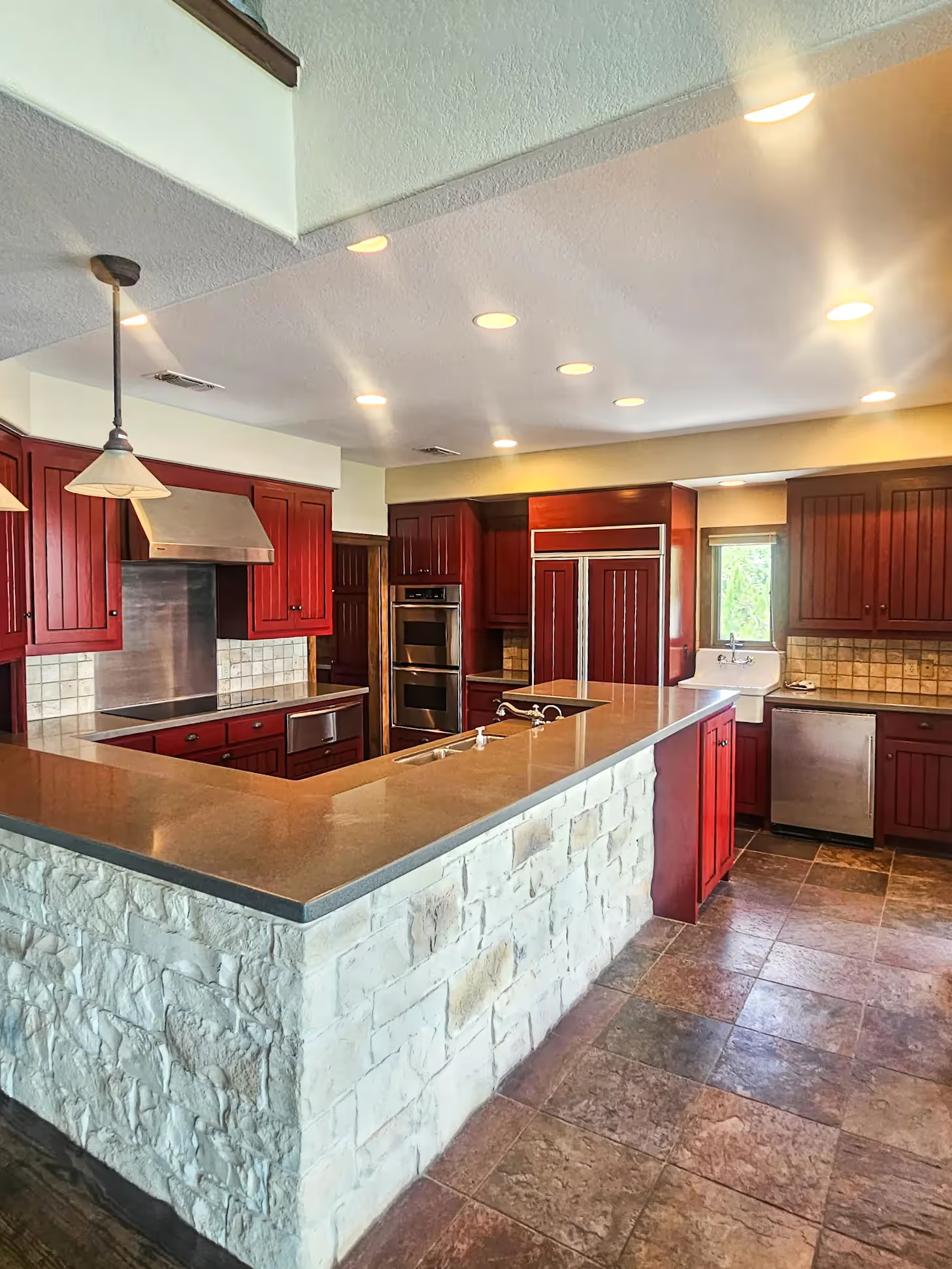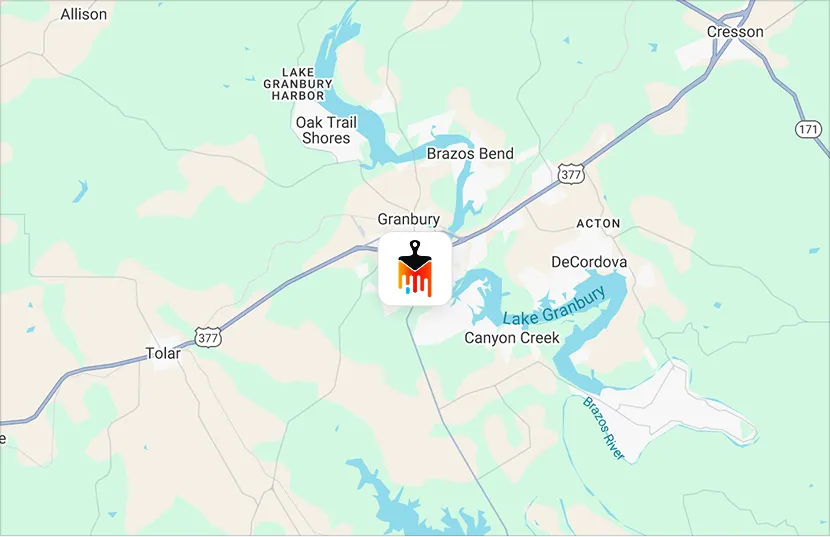Popcorn Ceiling Removal in Granbury, TX
Popcorn Ceiling Removal in Granbury, TX
Popcorn ceiling removal in Granbury, TX modernizes interiors, improves indoor air quality, and eliminates a dated texture that traps dust and stains. Many homes around Lake Granbury and the historic downtown area were built or updated during the era when acoustic ceilings were popular. For homeowners ready to update, understanding the full remediation process, local considerations, and realistic timelines helps make an informed decision.

Why remove popcorn ceilings in Granbury homes
- Improved aesthetics: Smooth or contemporary textures create brighter, cleaner-looking rooms and complement updated paint and trim.
- Better lighting performance: Popcorn surfaces scatter light and make rooms feel darker; removal increases effective light reflection.
- Easier cleaning and maintenance: Popcorn catches dust, cobwebs, and humidity-related staining common in North Texas summers.
- Resale and safety: Buyers frequently prefer modern ceilings. For homes built before 1980, asbestos testing is an important safety and disclosure consideration.
Granbury experiences hot, humid summers and occasional storms. That humidity can accentuate peeling and staining in textured ceilings, making removal not just cosmetic but practical for preventing mold spots and persistent discoloration.
Initial inspection and testing
A thorough inspection precedes any removal. The inspector checks ceiling condition, number of texture layers, and signs of past repairs or water damage. For houses built before 1980, small-sample asbestos testing is standard practice. If test results indicate asbestos, safe abatement protocols are required, which affects timeline and cost. Even when asbestos is not present, inspections identify underlying drywall or plaster damage that will affect the scope of work.
Containment and protection
Removing textured ceilings creates a lot of fine dust when done incorrectly. Professionals set up rigid containment to protect floors, walls, HVAC systems, and belongings. Typical containment steps include:
- Sealing doorways and vents with plastic and tape
- Installing dust barriers and walk-off mats
- Using negative air machines and HEPA filtration to minimize airborne particles
- Covering or removing furniture and fixtures
Proper containment reduces cleanup time, prevents dust migration to other rooms, and protects sensitive electronics and finishes.
Removal methods: wet-scraping vs mechanical
There are two common approaches depending on texture adhesion and substrate condition:
- Wet-scraping: The ceiling is misted in manageable sections to soften the texture. After a short dwell time, technicians gently scrape the material away. Wet methods reduce airborne dust and are often preferred when drywall underneath is sound.
- Mechanical removal: For very thick textures or multiple layers, mechanical tools may be used. When mechanical sanding is required, professionals use HEPA-filtered equipment and strict containment to capture dust.
Sanding is generally avoided when possible because it creates fine dust that travels easily and can damage the underlying drywall.
Repair, skim-coating, and finish options
Once texture is removed, ceilings rarely look finished. Common steps that follow:
- Assessment of drywall or plaster for dents, seams, and nail pops
- Skim-coating with joint compound to create a smooth, even surface
- Sanding the skim coat to feather edges and achieve a uniform plane
For the final look, homeowners commonly choose between:
- Smooth ceilings for a modern, clean aesthetic
- Orange peel texture for subtle, forgiving imperfections
- Knockdown or light texture for a transitional appearance
Color consultation and selection are part of finishing, with primer applied before paint to ensure adhesion and uniform coverage.
Repainting and final cleanup
Priming and repainting are the final steps. Professionals use primers matched to the condition of the ceiling and topcoats selected for durability and appearance. Repainting improves reflectivity and completes the transformation.
Post-job cleanup includes HEPA vacuuming, wiping surfaces, removing containment, and detailed cleaning of floors and fixtures. A thorough walkthrough ensures no residue remains and the site is returned to normal use.
Expected timelines
Timelines vary by size and complexity, but typical expectations are:
- Single room (10x12): 1 day for removal and containment; an additional day for skim-coating and touch-ups; paint day follows after drying.
- Multiple rooms or whole-home projects: 2 to 4 days for removal and repairs, plus 1 to 2 days for finishing and paint depending on drying times.
- Projects involving asbestos testing or remediation add time for sampling, lab results, and abatement scheduling.
Weather and humidity in Granbury can affect drying times for joint compound and paint, so allow for slight schedule adjustments during high-humidity periods.
Pricing considerations
Several factors influence cost:
- Square footage of ceilings
- Presence of asbestos or need for testing and abatement
- Number of texture layers and substrate condition
- Level of finish chosen (smooth vs textured)
- Accessibility, ceiling height, and presence of fixtures
- Extent of drywall repairs or replacement required
- Containment and cleanup scope
Homeowners should expect a detailed scope that separates testing or abatement fees, removal labor, drywall repairs, and finishing/painting so each cost element is clear.
Common popcorn ceiling issues in Granbury, TX and how removal solves them
- Peeling texture after humidity exposure: Removal eliminates the delaminating surface and allows for proper drywall repair.
- Staining from historic roof or plumbing leaks: Skim-coating and repainting restore uniform color and seal stains.
- Dust and allergen accumulation: Smooth ceilings are easier to clean and reduce trapped dust that affects indoor air quality.
- Outdated appearance that limits resale value: Updated ceilings contribute to a fresher, more marketable home interior.
Maintenance tips after removal
- Use gentle dusting and microfiber tools to keep smooth ceilings clean.
- Address roof or plumbing leaks promptly to prevent new ceiling damage.
- Maintain indoor humidity within a comfortable range to protect paint and drywall finishes.
- Repaint every 7 to 10 years or as wear dictates to preserve brightness and condition.
Final notes on safety and outcomes
Popcorn ceiling removal in Granbury, TX is a practical upgrade that enhances aesthetics, lighting, and cleanability. For older houses, asbestos testing is a necessary safety step. Hiring experienced technicians ensures proper containment, minimal disruption, and professional finishes that stand up to the region's humidity and wear. The result is a cleaner, brighter interior that complements updated paint and design choices common in modern Granbury homes.
Service Areas
Marin's Painting proudly serves a wide range of areas, ensuring top-quality painting services for both residential and commercial properties. Our team is dedicated to transforming spaces with precision and care.



